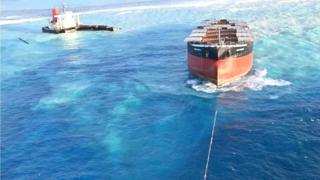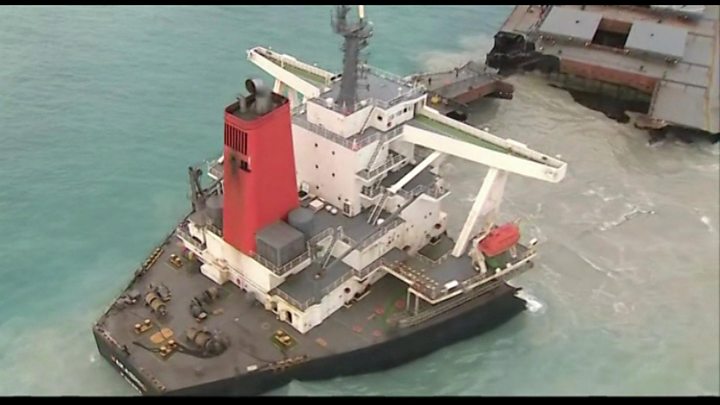
Image copyright
National Crisis Committee
Rough seas have made it too risky to remove the remaining oil from the ship which spilled hundreds of tonnes of the fuel off the coast of Mauritius, the national crisis committee says.
The MV Wakashio ran aground on a coral reef, Pointe d’Esny, on 25 July while carrying 4,000 tonnes of fuel oil, causing an ecological emergency.
Pointe d’Esny is a well-known sanctuary for rare wildlife.
The bow of the ship is being towed away from the reef.
The ship split in half over the weekend, and the rear part remains stranded on the reef.
About 90 tonnes of the fuel was believed to be on board in the engine room when the vessel split.

Media playback is unsupported on your device
“Due to the adverse weather conditions, it is still risky to remove the remaining small amount of residual oil in the engine room”, the National Crisis Management Committee said on Monday night, adding that “oil pumping operations should resume as soon as the weather permits.”
The BBC’s Yasine Mohabuth, in the capital Port Louis, reports that rough seas are currently being experienced around the coast of Mauritius caused by seasonal heavy swells.
The Japanese-owned MV Wakashio has already leaked about 1,000 tonnes of fuel oil into the uniquely biodiversity-rich marine ecosystem.
Mauritius has said it will seek compensation for the leak from “the owner and the insurer” and Japanese firm Nagashiki Shipping has pledged to respond to requests for compensation.
A team of experts from Japan are arriving in Mauritius on Wednesday to help with the clean-up, Japan’s foreign ministry has said.
Earlier this month, Mauritian Prime Minister Pravind Jugnauth declared a state of emergency and appealed for international help.
Volunteers took the matter into their own hands, filling sacks with straw to make barriers against the oil – despite orders from the government to leave the operation to the authorities.
On Monday, around 416 cubic meters of the homemade barriers – called booms – were collected and found to be saturated with oil, our correspondent reports.
Image copyright
EcoMode Society
The amount of oil spilled is relatively low compared with the big spills the world has seen in the past.
However, unlike most previous offshore spills, this has taken place near two environmentally protected marine ecosystems and the Blue Bay Marine Park reserve, which is a wetland of international importance.
Read MoreFeedzy


